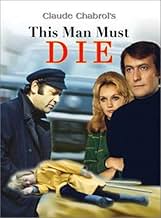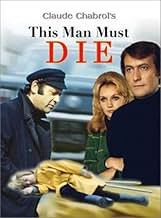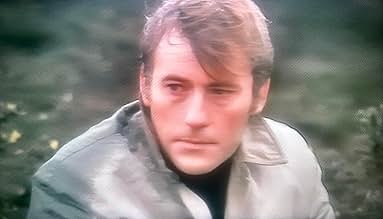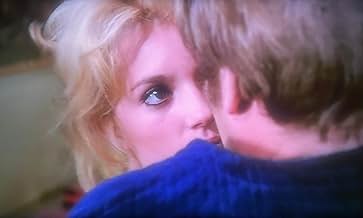IMDb रेटिंग
7.6/10
5.1 हज़ार
आपकी रेटिंग
अपनी भाषा में प्लॉट जोड़ेंA man asserts himself within the life of an actress he believes is somehow responsible for his son's death.A man asserts himself within the life of an actress he believes is somehow responsible for his son's death.A man asserts himself within the life of an actress he believes is somehow responsible for his son's death.
- निर्देशक
- लेखक
- स्टार
- पुरस्कार
- कुल 1 जीत
फ़ीचर्ड समीक्षाएं
This is a very fine psychologic thriller in some mellow tones. The story is simple : a boy gets killed by a mad car driver and his father wants to find the man to kill him. We know, from the start, that there can be two finale : the father kills the man, or he changes his mind. But Chabrol makes us think that it can have another finale... Or another? Or perhaps this one? Not at all! We never thought of the real finale. This is brillant, well written and directed movie. Very fine acting by Duchaussoy and Yanne.
In taking a slight cue from Alfred Hitchcock (one of Chabrol's heroes), but going another step further, This Man Must Die follows a logical turn of events for a single father who's son is run over in a hit and run by some cruel man in a fast car. In Hitchcock's hands this might be led by elegant stars, have even moments of scathing wit. But Chabrol's vision is a little darker, more that is seething under this surface, with the bourgeois as much of the commonplace as just the backdrop for the theater of revenge about to take place. But like the old master, Chabrol takes a twist with the material: as the father, Charles Thenier, going by an alias as a writer of children's books, gets more than acquainted with a woman who is the sister-in-law of the killer, gets to know the family more, and gets to know slimy, shrewd businessman and big-time garage owner Paul Decourt more, he's not really the only one out for his head.
As Chabrol goes further, it becomes a tale of Greek tragedy, or some variation on it. Paul's son, Philippe (a character as played by jean Yanne as if almost out of Bresson), hates his father with a passion, as his father has no respect for or tries to encourage his son with what he's got going on at school (perhaps conventionally, every scene with the father and son is a tense and violent outburst from father towards innocent son). One might think a collaboration might happen between the secretive, diary-writing Charles and the kind but frustrated kid, but this too isn't that simple. Chabrol also takes a smart tactic with that diary of Charles's; it could be just a narrative gimmick, and at times it feels as just that (maybe one of the film's only drawbacks, if only only on), but it does start to probe into a mindset that is one-track, and not without some reason in the genre sense. We're pitted on Charles's side, as he sneaks his way into Helen's heart, and then through her sometimes nice and other times (i.e. Paul's mother) savage in their verbal brutality.
But this same diary works as a something of a step-up from a psychological MacGuffin. Chabrol twists around with plot into motivation, and he pulls it off with his shooting and editing style, which applies just small, precise touches of the good old French New Wave into the proceedings (the occasional jump-cut, as any filmmaker knows, can't hurt under the right circumstances). What Chabrol's brilliant achievement is to transcend the trappings of a revenge film and to explore what the nature of malevolence brings past a simple crime- certainly these bastards have families, if they have the capacity to clear up their crimes with such skill like an owner of a hugely profitable auto-body/garage- and at the same time put a human angle into a plot that requires it. The actors do what they can (the man playing Charles, who I have not seen in other films, is very good in the lead, as is in his own right the man playing Paul Decourt, adding some layers to this rotten being), and despite some clunky scenes that do have to deal with the plot, there's some wit thrown in under the surface ("It's not a needle in a haystack, more like a needle in a box of needles,").
If This Man Must Die isn't a great film, and I'm not sure it is, it is at least a very successful example of finding some of the cracks in a revenge mystery, of adding that superlative mix of character into plot, and seeing what makes things like a diary, or a slip off a cliff, or an ambiguous ending, tick.
As Chabrol goes further, it becomes a tale of Greek tragedy, or some variation on it. Paul's son, Philippe (a character as played by jean Yanne as if almost out of Bresson), hates his father with a passion, as his father has no respect for or tries to encourage his son with what he's got going on at school (perhaps conventionally, every scene with the father and son is a tense and violent outburst from father towards innocent son). One might think a collaboration might happen between the secretive, diary-writing Charles and the kind but frustrated kid, but this too isn't that simple. Chabrol also takes a smart tactic with that diary of Charles's; it could be just a narrative gimmick, and at times it feels as just that (maybe one of the film's only drawbacks, if only only on), but it does start to probe into a mindset that is one-track, and not without some reason in the genre sense. We're pitted on Charles's side, as he sneaks his way into Helen's heart, and then through her sometimes nice and other times (i.e. Paul's mother) savage in their verbal brutality.
But this same diary works as a something of a step-up from a psychological MacGuffin. Chabrol twists around with plot into motivation, and he pulls it off with his shooting and editing style, which applies just small, precise touches of the good old French New Wave into the proceedings (the occasional jump-cut, as any filmmaker knows, can't hurt under the right circumstances). What Chabrol's brilliant achievement is to transcend the trappings of a revenge film and to explore what the nature of malevolence brings past a simple crime- certainly these bastards have families, if they have the capacity to clear up their crimes with such skill like an owner of a hugely profitable auto-body/garage- and at the same time put a human angle into a plot that requires it. The actors do what they can (the man playing Charles, who I have not seen in other films, is very good in the lead, as is in his own right the man playing Paul Decourt, adding some layers to this rotten being), and despite some clunky scenes that do have to deal with the plot, there's some wit thrown in under the surface ("It's not a needle in a haystack, more like a needle in a box of needles,").
If This Man Must Die isn't a great film, and I'm not sure it is, it is at least a very successful example of finding some of the cracks in a revenge mystery, of adding that superlative mix of character into plot, and seeing what makes things like a diary, or a slip off a cliff, or an ambiguous ending, tick.
Claude Chabrol made a lot of films during his career, and while I've only really scratched the surface so far - I have to say that this one is right up there with his very best! Chabrol's films aren't thrillers in the same vein as those made by the likes of Alfred Hitchcock (in spite of the fact that he is often known as 'The French Hitchcock'); with Chabrol the thrills don't come from moments of suspense or tension, but from the interest generated in the lead characters and the situation put forward, and that was never truer than with this film - perhaps the most sombre revenge movie ever made! The film starts off with a young boy returning home from the beach. However, his stroll is interrupted when a car comes out of nowhere and runs him down. The boy's father, a man named Charles Thenier, is distraught following the accident and vows to track down the man who did it. His thirst for revenge is great, but his hatred towards the murderer is so immense that he decides, one he finds him, to befriend and lure him into a false sense of security before killing him...
Since there's not a great deal of excitement in the visceral sense, it may seem on the surface that This Man Must Die does not do its job as a thriller. However, this couldn't be further from the truth. Chabrol's film is brooding and intriguing throughout and has a great sense of realism in the way that the wronged father goes after the man who killed his son. It has to be said that the film somewhat hinges on coincidence, but this is actually addressed within the film itself and the events that take place are largely logical. Once again, Chabrol's production values are high and the film is incredibly beautiful and it bodes well with the sober tone of the movie. The acting is fantastic, with Michel Duchaussoy doing well in the lead role and receiving excellent feedback from the lovely Caroline Cellier and the brilliant Jean Yanne who steals every scene he's in as the villain of the piece. The film boils down to an excellent conclusion that both comes as something of a surprise and adds some Greek tragedy into the mix. Overall, this is another big success for the great French director and comes highly recommended!
Since there's not a great deal of excitement in the visceral sense, it may seem on the surface that This Man Must Die does not do its job as a thriller. However, this couldn't be further from the truth. Chabrol's film is brooding and intriguing throughout and has a great sense of realism in the way that the wronged father goes after the man who killed his son. It has to be said that the film somewhat hinges on coincidence, but this is actually addressed within the film itself and the events that take place are largely logical. Once again, Chabrol's production values are high and the film is incredibly beautiful and it bodes well with the sober tone of the movie. The acting is fantastic, with Michel Duchaussoy doing well in the lead role and receiving excellent feedback from the lovely Caroline Cellier and the brilliant Jean Yanne who steals every scene he's in as the villain of the piece. The film boils down to an excellent conclusion that both comes as something of a surprise and adds some Greek tragedy into the mix. Overall, this is another big success for the great French director and comes highly recommended!
If there is a Gallic director who likes to surprise his admirers with new tricks,unexpected methods and iconoclastic stance,it is new wave master Claude Chabrol.There have been many bright moments in his illustrious career when he has made films for them which could only be appreciated by a sharp brain and attentive eyes.Que la bête meure is a hard to classify film which is neither a thriller nor a run of the mill revenge drama.It is a film which plays with all leading conventions of these two genres.This man must die starts well with the depiction of a reckless accident.It is quite possible that this might induce inattentive viewers to regard it as a revenge drama.This is not the case as viewers are quickly caught in a maze of crucial dramatic scenes that have direct bearing on film's progress.Caroline Cellier and Michel Duchaussoy perform well as lovers whose relationship has a lot of bearing on this film's progress.Chabrol is known for avoiding a not so happy end for his film.This is the reason why "This man must die" will prepare you to imagine your own type of end in order to do injustice to the concept of happy end of this film.
A particularly difficult film to comment upon without giving away vital plot elements but it has to be one of the director's finest. It has the suspense he can work so well, it has the the French bourgeoisie at their worst, it has gentle eroticism and sudden brutality.
We also have here superb story telling combined with high emotional content and a continuous switchback ride of twist and turns, even though we, seemingly,have the whole plot of the film placed openly before us within minutes of the opening credits.
Meticulously directed, there is not a superfluous scene, nor even a superfluous gesture. It is pure riveting cinema from start to finish
Great performances, great camera-work, great Chabrol.
We also have here superb story telling combined with high emotional content and a continuous switchback ride of twist and turns, even though we, seemingly,have the whole plot of the film placed openly before us within minutes of the opening credits.
Meticulously directed, there is not a superfluous scene, nor even a superfluous gesture. It is pure riveting cinema from start to finish
Great performances, great camera-work, great Chabrol.
क्या आपको पता है
- ट्रिवियाThis film is based on a British novel of the 1930s written by the poet C. Day Lewis (under the pseudonym "Nicholas Blake") and is one of several novels by him to feature as its hero the brilliant amateur sleuth Nigel Strangeways. This adaptation, in addition to moving the action to modern-day France, entirely leaves out this leading character (or any new French character equivalent to him).
- गूफ़At the beginning Paul is shifting several times although the Mustang has an automatic transmission.
- कनेक्शनFeatured in Le cinéma passe à table (2005)
- साउंडट्रैक4 ernste Gesänge Op. 121
Music by Johannes Brahms (as Brahms)
Performed by Kathleen Ferrier (as Katleen Ferrier)
Disque DECCA ACL 306
टॉप पसंद
रेटिंग देने के लिए साइन-इन करें और वैयक्तिकृत सुझावों के लिए वॉचलिस्ट करें
- How long is This Man Must Die?Alexa द्वारा संचालित
विवरण
- चलने की अवधि
- 1 घं 50 मि(110 min)
- ध्वनि मिश्रण
- पक्ष अनुपात
- 1.66 : 1
इस पेज में योगदान दें
किसी बदलाव का सुझाव दें या अनुपलब्ध कॉन्टेंट जोड़ें





























